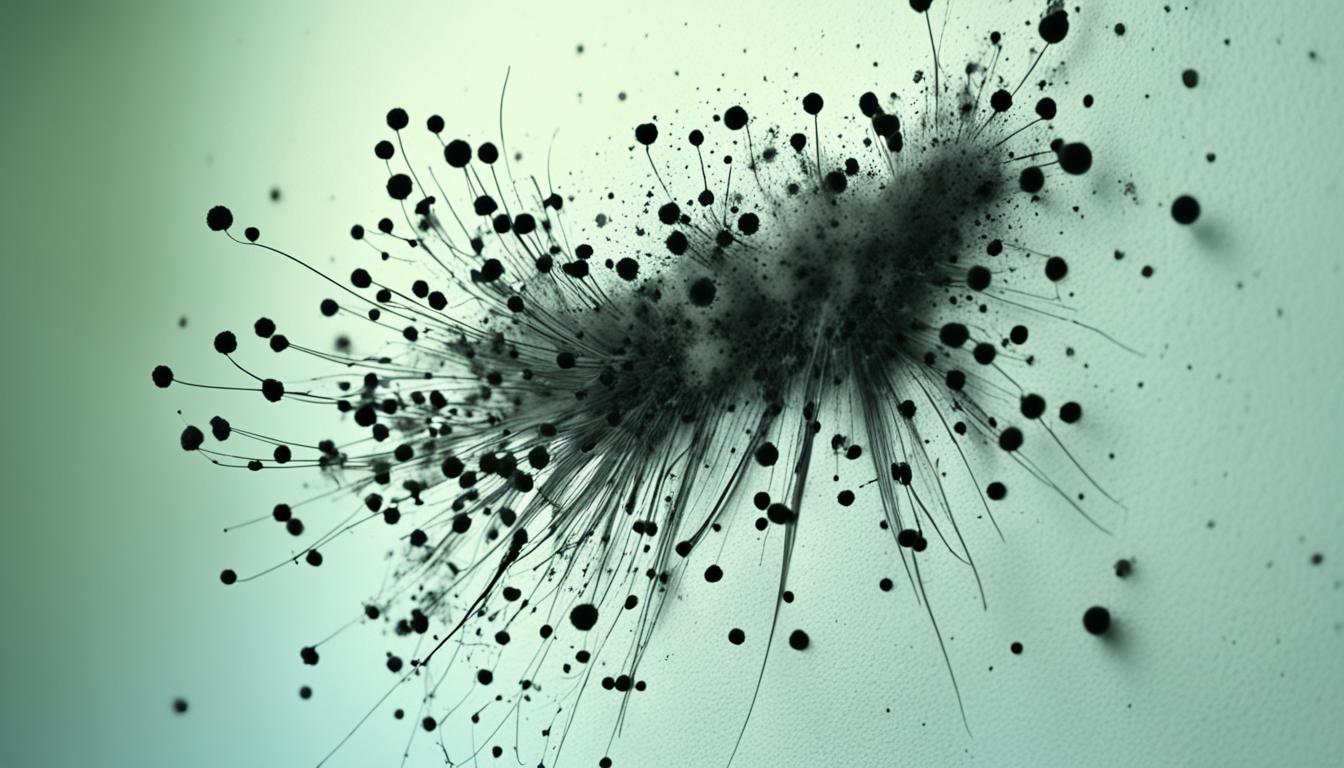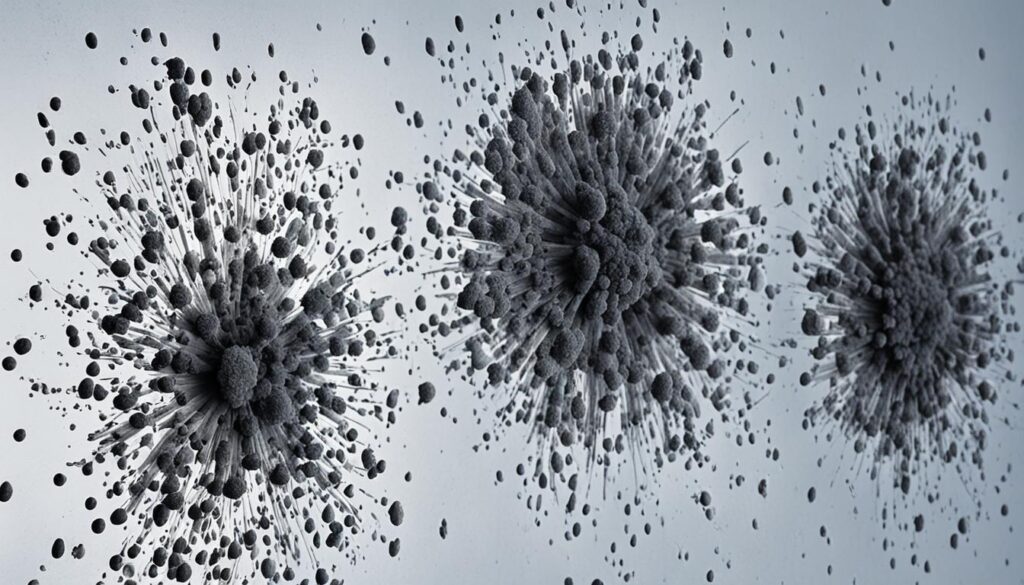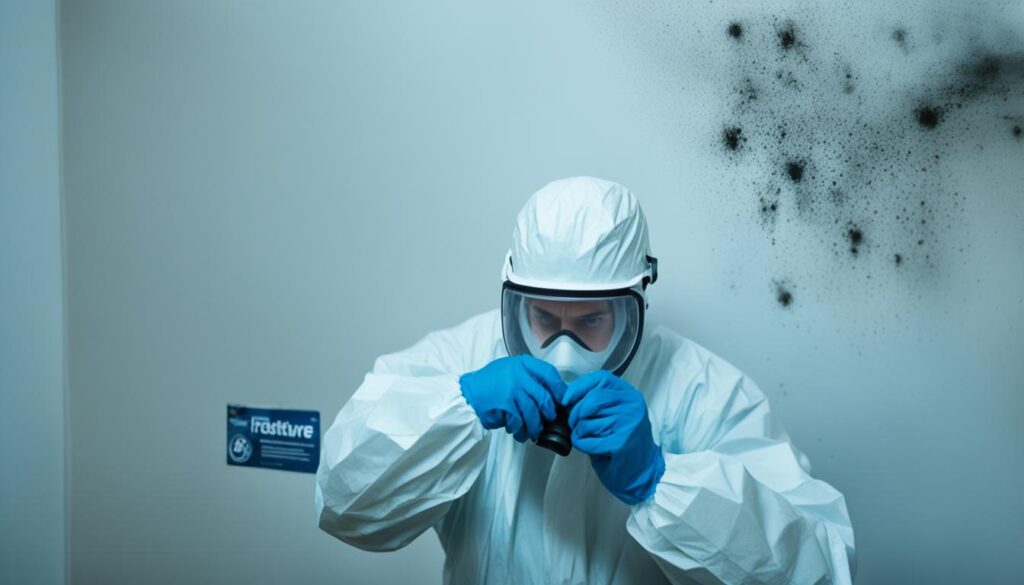
Health Effects of Black Mold: Risks & Protection
Black mold is a commonly found type of mold that can have detrimental effects on human health. Understanding the risks associated with black mold exposure is crucial for safeguarding your well-being and that of your loved ones. In this section, we will explore the health effects of black mold and provide strategies for protection against its harmful effects.
Key Takeaways:
- Exposure to black mold can lead to respiratory issues and allergies.
- Prolonged exposure to black mold may result in more severe health complications.
- Preventive measures, such as controlling moisture levels and improving ventilation, are crucial for protecting against black mold.
- Regular inspections and proper cleaning techniques can help minimize the risk of black mold growth.
- Seeking professional assistance for mold assessment and remediation is essential for comprehensive protection.
Understanding Black Mold and its Health Risks
Black mold, scientifically known as Stachybotrys chartarum, is a type of fungi that thrives in damp and humid environments. It is often characterized by its dark green or black appearance and has a distinct musty odor. This type of mold can commonly be found in areas with water damage or excessive moisture, such as basements, bathrooms, and attics.
Black mold poses significant health risks to humans, primarily when exposed to it for extended periods. Direct contact or inhalation of black mold spores can lead to various health complications.
Exposure to black mold can trigger respiratory issues, including coughing, sneezing, and wheezing. Individuals with pre-existing respiratory conditions, such as asthma or allergies, may experience exacerbated symptoms when exposed to black mold. The spores released by black mold can also cause allergic reactions, leading to skin rashes, itching, and irritation.
Furthermore, black mold produces mycotoxins, which are toxic substances that can be harmful when ingested or inhaled. Prolonged exposure to mycotoxins may result in more severe health complications.
In addition to respiratory problems and allergic reactions, exposure to black mold has been linked to other health issues, including:
- Headaches and migraines
- Fatigue and lethargy
- Dizziness and nausea
- Memory loss and difficulty concentrating
- Weakened immune system
“It’s important to note that the severity of the health risks associated with black mold exposure may vary depending on an individual’s sensitivity, the extent of exposure, and the overall health condition.”
Preventive Measures
To protect yourself from the health risks of black mold, it is crucial to take preventive measures to minimize its growth and exposure. Here are some essential strategies:
- Control moisture levels in your home by promptly addressing leaks, repairing water damage, and ensuring proper ventilation.
- Use dehumidifiers in areas prone to excess humidity, such as basements and bathrooms.
- Regularly inspect and maintain your home’s plumbing system to prevent water leaks or drips.
- Ensure proper ventilation in high-moisture areas, such as kitchens and bathrooms, by using exhaust fans or opening windows.
- Regularly clean and dry areas prone to moisture, such as shower curtains, bathroom tiles, and basement walls.
- If you notice signs of black mold growth, such as visible mold patches or a musty odor, seek professional assistance for remediation.
By implementing these preventive measures, you can significantly reduce the risk of black mold growth in your home and protect your health and the well-being of your family.

| Health Risks of Black Mold Exposure | Symptoms |
|---|---|
| Respiratory Issues | Coughing, sneezing, wheezing |
| Allergic Reactions | Skin rashes, itching, irritation |
| Headaches and Migraines | Severe headaches and migraines |
| Fatigue and Lethargy | Feeling tired and lacking energy |
| Dizziness and Nausea | Feeling lightheaded and experiencing stomach discomfort |
| Memory Loss and Difficulty Concentrating | Trouble remembering and focusing |
| Weakened Immune System | Increase in susceptibility to infections |
Protecting Yourself from Black Mold
When it comes to black mold, prevention is key. By implementing the right strategies, you can protect yourself and your home from the harmful effects of this toxic fungus. Here are some essential prevention strategies to keep in mind:
1. Control Moisture Levels
Black mold thrives in damp environments, so it’s crucial to control moisture levels in your home. Keep an eye out for plumbing leaks, roof leaks, or any signs of water damage. Make sure to promptly address these issues and repair any leaks to prevent the growth of black mold. Proper ventilation in areas prone to moisture, such as bathrooms and kitchens, can also help reduce moisture levels.
2. Improve Ventilation
Adequate ventilation plays a significant role in preventing the growth of black mold. Opening windows and using exhaust fans can help circulate fresh air and reduce humidity levels. Consider using dehumidifiers in areas with high humidity to maintain optimal moisture levels and discourage mold growth.
3. Conduct Regular Inspections
Regular inspections are essential to detect any signs of mold growth early on. Inspect areas prone to moisture, such as basements, crawl spaces, and attics, for any visual indications of mold, such as discoloration or a musty odor. Additionally, pay attention to allergic reactions or respiratory issues that may indicate the presence of mold in your home.
4. Proper Cleaning and Remediation Techniques
If you discover black mold in your home, it is crucial to use proper cleaning and remediation techniques to minimize the risk of exposure. When cleaning mold, wear protective gear such as gloves, a mask, and goggles to avoid contact with spores. Use appropriate mold cleaning solutions and follow the recommended guidelines for effective removal.
Remember, when dealing with extensive mold growth or if you are unsure of the severity, it is best to seek professional assistance. They have the expertise and tools to assess the situation accurately and provide effective mold remediation services.

By implementing these prevention strategies, you can create a healthier living environment and protect yourself and your loved ones from the potential health risks associated with black mold exposure. Stay proactive and prioritize mold prevention in your home to ensure a safe and mold-free environment.
Conclusion
The health effects of black mold can be significant and should not be taken lightly. Exposure to black mold can lead to various respiratory issues, allergies, and other health complications. It is crucial to understand the risks associated with black mold and take proactive measures to protect oneself and their loved ones.
Prevention is key when it comes to black mold. Controlling moisture levels in your home, improving ventilation, and conducting regular inspections can help minimize the risk of black mold growth. Additionally, proper cleaning and remediation techniques, carried out by professionals like Fix Mold Miami, are essential to ensure the complete removal and prevention of black mold.
If you suspect black mold in your home or experience any related symptoms, it is vital to seek professional assistance. Fix Mold Miami offers mold assessments and remediation services to help you tackle black mold effectively. Remember, early detection and intervention are crucial to protect your health and create a safe living environment for you and your family.




